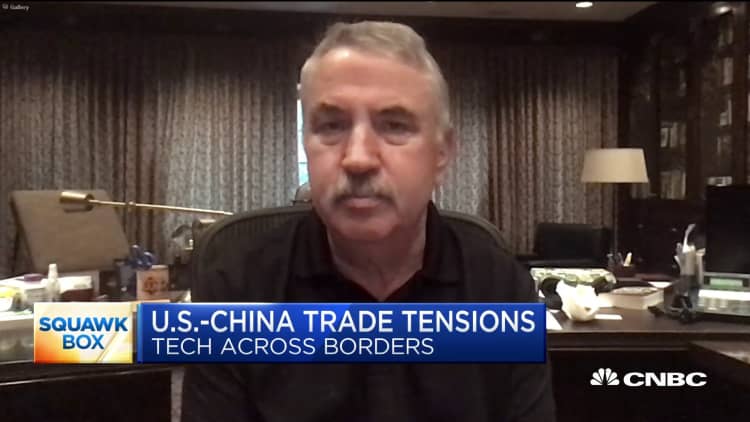
New York Times columnist Thomas Friedman told CNBC on Tuesday he applauds President Donald Trump's decision to take a harder stance on China than previous commanders in chief.
"Donald Trump is not the American president America deserves, in my opinion. But he definitely is the American president China deserved," Friedman said on "Squawk Box." "We needed to have a president who was going to call the game with China. And Trump has done it, with I would say more grit and toughness than any of his predecessors. I give him credit for that."
At the same time, Friedman said he believes the way Trump sought to confront China over international trade and other geopolitical issues would have been more constructive if he had brought along American allies from the outset.
"[Trump] thought he could do it alone. He thought he could do it without a coalition," the Pulitzer Prize-winning journalist said. "Remember, it was the country that had the biggest coalition that won World War I. It was country that had the biggest coalition that won World War II. It was the country that had the healthiest coalition that won the Cold War, and it will be same with China."
Despite his analogies, Friedman said he was not "looking for a war" between the U.S. and China. But the world's two largest economies are engaged in a critical "struggle," he contended.
"I've always felt from the beginning that if we made this challenge with China, the United States alone versus China, we will lose," said Friedman, who works at what Trump has repeatedly called "the failing New York Times" for what the president considers a liberal bent at the media organization. "If we make it the world versus China, on what are the right and fair rules of international commerce and technology in the 21st century, we can win."
Friedman, while critical of Trump on many issues, wrote in 2018 that the economic fight with China is "worth having," adding the president's "instinct is basically right" to hold the line "before China gets too big."
Trump, who is seeking reelection in November, has adopted a sharply critical stance on China during his first term in the White House. He set off a major trade dispute that resulted in the two nations placing billions of dollars of import tariffs on each other's goods before reaching a phase one trade deal.
More recently, Trump has focused his ire on Chinese technology companies, accusing them of presenting national security risks to the U.S. The Chinese firms have denied the various allegations. The administration has placed tight restrictions on telecommunications giant Huawei Technologies, and more recently taken steps to restrict access in the U.S. for two popular apps owned by Chinese tech firms, ByteDance's TikTok and Tencent's WeChat.
Friedman said there are numerous concerns over how technology is used across the world, noting that years ago the U.S. government reportedly breached Huawei's own network as part of an intelligence gathering operation. Technology is only getting more sophisticated, with household items potentially being "dual use" for civilian and military purposes, he said.
"There needs to be a kind of global conversation between the [European Union], America and China over how we're going to do this, otherwise we're heading for a ... digital Berlin Wall," Friedman said. "The world will be less stable and it'll be less prosperous if that's where we go."


